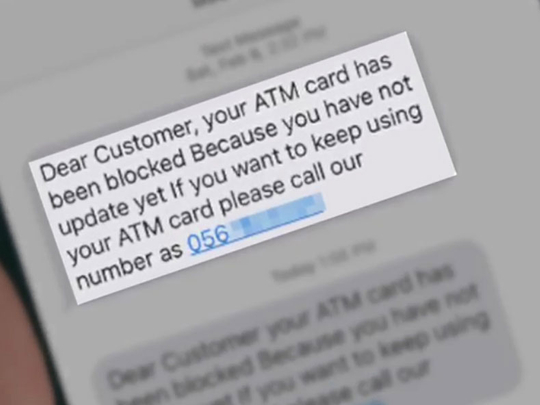
Dubai: From calls telling you that you have won a prize from your bank, to text messages warning you that your account has been blocked, there are various ways in which fraudsters can try to trick you to get access to your bank account details.
The UAE Banks Federation (UBF) has launched an awareness campaign, educating people to follow a three-step approach – stop, think and protect – in order to fight bank fraud.
Here is how you can protect yourself against email fraud, fraudulent messages on social media, scam calls or emails.
Email Fraud
You might receive email from unknown email IDs, asking you to click on a link.
Stop
When you receive an email stating:
• Your account or card has been blocked.
• Your account details require update of personal details.
Think
• Is your name mentioned in the email? If not, would you get such emails?
• Are you marked as BCC in the email, and your email ID is not visible?
• Is the sender’s email ID matching 100 per cent with the email ID of your bank or other entities? Or is there a slight mismatch?
Protect
Your bank would never ask for your personal details in such a manner.
Do not click on links received from unknown senders.
If you suspect that your personal details have been compromised, report it immediately to your bank.
Social Engineering
Do not get tricked into sharing sensitive and personal information over social media.
Stop
• Responding to strangers online asking you to share OTP
• Clicking on pop-up banners claiming your computer is infected
• Entertaining friendly callers from getting your personal information by gaining your trust
• Acting upon mails of messages that create urgency to take action
Think
• Could this be genuine?
• Is it safe to share personal information with a stranger?
• Will your bank call to ask for your personal information?
Protect
Do not share your OTP or personal information.
Limit the information you share on any digital channel.
Create strong and complex passwords and change them frequently.
Do not download or install suspicious apps.
If you suspect that your personal details have been compromised, report it immediately to your bank.
Phone Fraud
You might receive messages or calls from people who impersonate as staff of bank, police, government departments, courier companies or telecom providers etc. They want your personal details to commit fraud.
Stop
When you receive messages or calls asking for:
• Your account number, E-ID number, email ID or bank name etc.
• One Time Password (OTP) sent by your bank.
Think
• Did the caller tell you from which bank they are calling or they are simply stating they are calling from “your bank”?
• Did you leave any message on the social media page of your bank recently and could the caller have seen that message?
• Why would caller need your confidential OTP sent by your bank?
• Is the call coming from a mobile number, why would they not call you from landline?
Protect
Your bank would never ask for your personal details in such manner.
Never share One Time Password (OTP) with anyone, they can commit fraud if they have it.
If you suspect that your personal details have been compromised, report it immediately to your bank.
Advance Fee Scam
Fraudsters contact victims to inform them that they have won a prize and ask for money or information to process the same.
Stop
• Participating in dubious lucky draws.
• Responding to messages saying you have won when you haven't participated in the first place.
Think
• If the call or email is genuine, why would caller require your information? They should already have it.
• Why does the call require you to pay fees for getting the prize?
• Did the caller address you by name or simply mentioned “Sir/Madam”?
Protect
• Never share your personal details with anyone, it can be used to take money from your account or card.
• If you suspect that your personal details have been compromised, report it immediately to your bank.
Business email compromise
Sometimes fraudsters impersonate people you know at work and ask you to redirect funds/payments to an account under their control.
Stop
• Is the sender asking you to transfer money to a different account?
• Is the email ID matching with the email ID of your friend or business partner 100 per cent?
Think
• Is it possible for someone to send you an email on behalf of your business partner or friend?
• How can you verify that the email asking you to send money to a different account has been sent by the genuine person?
Protect
• Always call only on your client’s known phone numbers for verification and not on the numbers mentioned in an email.
• Have an updated Anti-Virus software on your computers to blockmalware/viruses/key loggers.
• If you suspect that your personal details have been compromised, report it immediately to your bank
Simple steps to secure your digital banking
When it comes to online banking, there are simple ways in which you can protect yourself, according to UBF:
• Do not access your mobile banking from unsecured public Wi-Fi.
• Never share your user ID or password with anyone.
• Avoid clicking on unknown links and refrain from downloading random apps.
How to report bank fraud
According to the UBF, you should always report the fraud to your bank as well as the federation. Once you have reported it to your bank, visit www.uaebf.ae/en/fight-fraud to report it to the federation.







